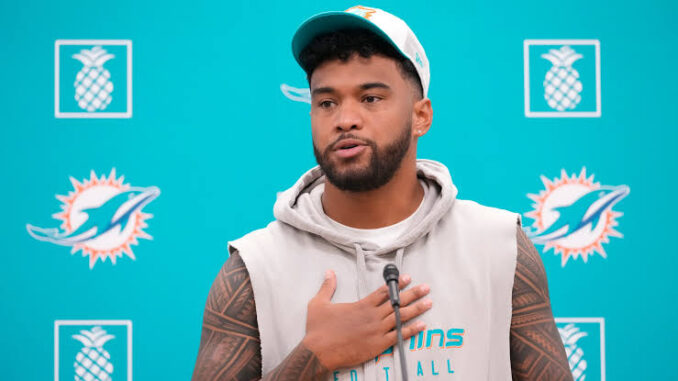
Miami Dolphins quarterback Tua Tagovailoa has made headlines once again, this time for his decision not to wear a guardian cap, even after suffering multiple concussions during his NFL career. The choice has raised questions among fans, experts, and fellow players about the balance between player safety and performance in a sport as physically demanding as football.
Guardian caps, introduced in recent years, are soft-shelled helmet covers designed to reduce the impact of head-to-head collisions during practices. They have become a common sight in the NFL, especially for linemen and players who are frequently involved in high-impact contact. For players like Tagovailoa, who have already suffered concussions, the guardian cap can potentially offer an added layer of protection. Despite this, Tagovailoa has opted not to use the cap, a decision that has sparked debate.
Tagovailoa’s concussions, most notably during the 2022 season, have been a source of concern for both his team and the wider NFL community. His head injuries were a significant talking point, especially after a particularly alarming incident in Week 4 of the 2022 season against the Cincinnati Bengals, where he suffered a concussion that left him temporarily immobilized on the field. That moment reignited discussions about the long-term health risks for players, particularly regarding brain trauma and conditions like Chronic Traumatic Encephalopathy (CTE), which has been linked to repeated head injuries.
In interviews, Tagovailoa has acknowledged the risks but has remained confident in his decision. When asked why he decided against wearing the guardian cap, he explained that while he understands the importance of player safety, he feels that the cap affects his comfort and performance on the field. Quarterbacks, who rely on precision, vision, and mobility, often speak about the sensitivity of their equipment, as even slight changes can impact their game.
Tagovailoa’s decision has drawn a wide range of reactions. Many former players and analysts have supported his right to make personal decisions about his safety. After all, football is a high-risk sport, and athletes are constantly weighing the risks they are willing to take for their careers. Others, however, have expressed concern, noting that given his history of concussions, it might be in his best interest to take every precaution available.
Some neuroscientists and medical experts have pointed out that while guardian caps can reduce the severity of impacts during practice, they are not a cure-all. The helmet technology in the NFL has improved significantly over the years, but head injuries remain a fundamental risk of the sport. Even with the best equipment, concussions can and do happen. Some experts argue that improving tackling techniques and limiting high-impact plays may have a more significant impact on reducing concussions than relying solely on protective gear.
The Dolphins organization has largely supported Tagovailoa in his decision, but they have also taken steps to monitor his health closely. Tagovailoa has worked with specialists and undergone regular testing since his concussions, and the team has been cautious in ensuring he follows concussion protocols.
As Tagovailoa continues his career, the debate over player safety, equipment, and personal responsibility in the NFL will likely continue. For Tua, his focus remains on leading the Dolphins on the field, but his decision not to wear the guardian cap underscores the difficult choices professional athletes face when balancing performance and long-term health. Ultimately, it’s a personal decision, but one that will be closely watched, given his history and the broader concerns about concussions in football.
Leave a Reply